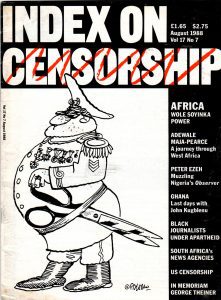09 Mar 12 | Africa, Magazine
 To celebrate Index’s 40th birthday, our publisher SAGE is opening the archive to the public for 40 days from 26 March. It’s a unique literary heritage, a roll-call of the greatest authors in the 20th century canon standing up for free expression.
To celebrate Index’s 40th birthday, our publisher SAGE is opening the archive to the public for 40 days from 26 March. It’s a unique literary heritage, a roll-call of the greatest authors in the 20th century canon standing up for free expression.
In 1994, South African writer, activist and Nobel Prize winner Nadine Gordimer witnessed the end of apartheid in South Africa when the black population voted for the first time.
Nadine Gordimer will be speaking at the Southbank Centre on 14 March in the first of a series of events celebrating Index’s anniversary. Get tickets here.
(more…)
15 Sep 88 | Magazine Editions, Volume 17.08 September 1988
[vc_row][vc_column][vc_column_text]

Africa: Wole Soyinka on power, the August 1988 issue of Index on Censorship magazine.
by Matthew Hoffman
At a party not long ago, I met a man who told me that he had been trying to write a script for broadcast on one of the foreign services to Eastern Europe. His job was to try to explain why the Spy-catcher saga was considered a threat to freedom in the United Kingdom by •so many people, including two of five Law Lords (who had just delivered judgment on an injunction continuing a temporary ban on publication of Peter Wright’s account of his career as an intelligence officer, or discussion of its contents, in Britain). The problem was that in Eastern Europe it hardly seemed shocking that the memoirs of a former spy should be suppressed: if this was the worst threat to freedom that the West faced, then freedom must be doing pretty well in this part of the world. Yet the scriptwriter was convinced freedom was not doing well at all.
Index on Censorship provides a chronicle of the suppression of political and artistic speech around the world. Although it mentions cases and judgments that impinge on these areas in the Western democracies, most of its attention is focused on the more dramatic cases found in other regions. Dissidents from the Soviet Union are given an airing in these pages denied them at home, as are African and Asian representatives of banned political parties and tendencies not approved of by official government censors. Western equivalents of these writings would not be banned here; they might even be celebrated. The crime of slandering the state — a fearsome one in many countries — was long ago abolished in the West, for the good reason that criticism of the state is considered essential to a healthy society, and such a charge would inhibit such criticism.
Why then has Index, and The Independent newspaper, which has joined with it in the preparation of this special issue, felt it necessary to devote an entire number of its magazine to examining the state of freedom in Britain? The answer is the same as that given by the radio script writer who had to explain his fears on this score to an Eastern European audience, Freedom is not a given, with clear boundaries, that all men can always recognise. It is an imaginative accomplishment, like a work of art, and it must have a concrete realisation for people to judge its worth and, even, to learn to love it.
[/vc_column_text][/vc_column][/vc_row][vc_row][vc_column width=”1/4″][vc_icon icon_fontawesome=”fa fa-quote-left” color=”black” size=”xl” align=”right”][/vc_column][vc_column width=”3/4″][vc_column_text]
It is the responsibility of those states where freedom is most at home to nourish and sustain it, and to extend its boundaries. As a result of such creative experiments, other peoples can point to examples of what Ronald Dworkin in these pages calls ‘the culture of liberty’ and say, ‘We want that, too.’ If freedom is diminished in the United Kingdom, where historically it has deep roots, it is potentially diminished everywhere.
[/vc_column_text][/vc_column][/vc_row][vc_row][vc_column][vc_column_text]
In 1741, when the philosopher and historian David Hume set out to account for the liberty of the press in Britain, he noted: ‘Nothing is more apt to surprise a foreigner, than the extreme liberty which we enjoy in this country, of communicating whatever we please to the public, and of openly censuring every measure entered into by the king or his ministers’. This proud boast has been a source of delight to British writers for centuries, but, at the same time, as Peter Hennessy reminds us in his essay on ‘official secrets’, the classes that serve the king and his ministers have been equally strenuous in keeping as much communicable matter as possible out of the public sphere.
There has long been a tension between freedom of the press and the secrecy of the governors. It is the considered belief of the writers in this issue of Index, for reasons set out in their essays, that this tension is in danger of being resolved in ways that favour the keepers of secrets over the tellers of tales. A glance over the table of contents reveals the extent of the front which they seek to defend: from traditional journalism (John Lloyd, Jeremy Warner, Duncan Campbell), through the broadcasting media (Mark Bonham Carter, Brian Wenham), including the public speech of pickets and demonstrations (Costas Douzinas), on to academic freedom and the danger of a centralising government (Roy Jenkins), and into the cultural and personal realms (John Mortimer, Adam Mars-Jones and Stephen Spender). These positions are linked together by thematic points, developed by Ronald Dworkin, Peter Hennessy and Richard Hoggart, that show not just a government, but a whole society, that seems to have lost its will to welcome diversity of opinion.
I think I can just detect, however, the whiff of a welcome shift in the climate of liberty, prompted to some extent by the kinds of concerns that are expressed in these articles. A number of court judgments — despite being subsequently overturned or in the minority — have emphasised the overriding, and constitutionally protected, importance of a free press. Recently, the express wish of the Foreign Secretary to ban the broadcast of two investigative TV programmes, on the shootings by the SAS of three IRA terrorists in Gibraltar, was rejected by both Independent Television and the BBC.
I referred above to the imaginative accomplishment of free speech. The government would claim that it is not producing new bans on freedom, but responding to a more outspoken society. The BBC used not to do investigative reporting; spies used not to publish their memoirs; local councils used not to concern themselves with homosexual rights; and civil servants used to keep their silence. (And Oxford University used, without fuss, to give honorary doctorates to Prime Ministers.) But freedom is not just the freedom to do what has been done before, it is the right to think of new things to do and say, and to try them out.
It is often remarked that Mrs Thatcher’s government has been trying to Americanise the British economy, to instil it with the spirit of capitalist competitiveness, without wanting to copy America’s acceptance of diversity of values. In the United States —in theory at least — economic, political and cultural freedom are of a piece. They each imply, and support, the others. And a free press is cherished as the agent that allows their interplay. This is a legacy of the British enlightenment, celebrated by David Hume, that has been preserved and developed across the sea’. Many of the new demands for freedom of information were first articulated in the United States. We may be witnessing the pains of an attempt to re-import a British invention, which like many another has been perfected abroad.
Matthew Hoffman, who edited this issue of Index on Censorship, is an editor on The Independent.
[/vc_column_text][/vc_column][/vc_row]
 To celebrate Index’s 40th birthday, our publisher SAGE is opening the archive to the public for 40 days from 26 March. It’s a unique literary heritage, a roll-call of the greatest authors in the 20th century canon standing up for free expression.
To celebrate Index’s 40th birthday, our publisher SAGE is opening the archive to the public for 40 days from 26 March. It’s a unique literary heritage, a roll-call of the greatest authors in the 20th century canon standing up for free expression. 